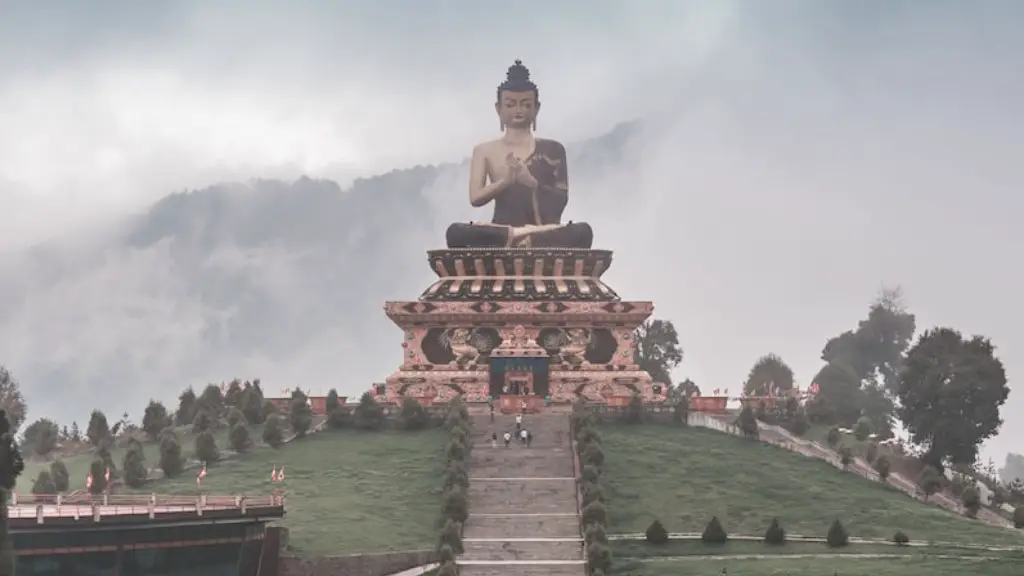Belief in an Afterlife
Hinduism is one of the world’s oldest religions and has a rich history of spiritual beliefs, practices, and rituals. It places great importance on the afterlife, believing in numerous life forms in the spirit world that are believed to exist beyond our physical realm. The Hindu concept of an afterlife is based on the fundamental principle of karma, which states that all actions in life will have a lasting effect in the afterlife. As such, Hindus believe that after death, a being’s soul is reborn into another life form and is rewarded or punished based on their actions in the previous life. While Hinduism does not provide a single answer to the existence of an afterlife, the belief in the spiritual realm and the power of karma keeps the concept alive.
The Cycle of Rebirth
The widely accepted belief in Hinduism is that after physical death, the soul of a person will be reincarnated into another life form. This process is known as ‘Samsara’, or the cycle of rebirth. According to Hinduism, samsara is a continuous cycle of birth and death and the soul will only attain salvation and achieve an afterlife if it is able to break free from the cycle of rebirth. The cycle of rebirth is closely linked to the concept of karma, which states that an individual’s actions in this life will shape the lives of their future incarnations.
The Three Destinations of Karma
Hinduism does not provide a single answer to the concept of an afterlife but instead offers three possible destinations for the soul based on one’s karma. These destinations are known as the ‘three destinations of karma’ and are categorised as heaven, hell and the cycle of rebirth. Those with positive karma will be rewarded with a place in heaven, while those with negative karma will be punished in hell. Those with a balance of both positive and negative karma will be born again in a cycle of rebirth.
The Journey of the Soul
Hinduism provides a detailed description of the journey of the soul after death. It is believed that the soul will depart from the body and travel to the spiritual realm. During this journey, depending on the individual’s karma, they could either be taken to heaven or to hell. Those who are destined for the cycle of rebirth will also travel to the spiritual realm before being reincarnated into a new body.
The Hindu Experience of An Afterlife
The Hindu experience of an afterlife is influenced by the individual’s actions in this life. This is why practices such as meditation, charity and fulfilling one’s duties are highly regarded in Hinduism. These practices are believed to help one accumulate more positive karma and ensure that they are rewarded with a place in heaven after death.
The Concept of Moksha
The ultimate goal of an afterlife in Hinduism is to achieve moksha, or liberation of the soul. To achieve moksha, one must reach a state of enlightenment and transcend the cycle of rebirth. This state is seen as being the highest and most desirable destination for the soul, as it is believed to be a state of extreme bliss and perfect peace. Achieving moksha is seen as being the ultimate reward for a life well lived and is believed to be the highest form of afterlife anyone can hope for.
The Power of Prayers and Rituals
Hinduism also places great importance on the power of prayers and rituals. Prayers and rituals are seen as an effective way of influencing the afterlife and can be used to influence the soul’s journey and ensure that it is able to break free from the cycle of rebirth and reach a state of moksha. Some rituals, such as ‘Pind Daan’, are believed to be able to ensure a positive afterlife and aid the soul’s journey in the spiritual realm.
The Significance of Death in Hinduism
Death is an important part of the Hindu faith and holds a special significance. Hindus believe that death is the start of a new journey for the soul and see it as a time for reflection, renewal and spiritual awakening. It is also seen as a time to honour the life of the departed and to give thanks for the time spent together. Hinduism does not view death as the end of something, but rather as a new beginning and a chance to be reunited with loved ones in the afterlife.
Synchronicity with a Spiritual Realm
The Hindu belief in an afterlife is closely linked to the idea of synchronicity with a spiritual realm beyond our physical realm. Hindus believe that this realm exists and is the source of all things in the Universe. This is why Hinduism places such a strong emphasis on developing a strong spiritual connection and cultivating positive karma as this connection is believed to ensure a positive afterlife and journey in the spiritual realm.
Features of Reincarnation in Hinduism
The core belief of Hinduism is that the soul is reborn into a new life form after death. The features of this rebirth vary based on the individual’s karma, with the most positive karma affording a life of high social status and material wealth. Those with negative karma will be reborn into lower life forms and in lower societies, with their suffering in this life punishing them in the afterlife.
The Role of Dharma
Dharma plays a key role in Hinduism and its concept of an afterlife. It is believed that upholding dharma, or one’s moral and spiritual duties, is essential in order to achieve a positive afterlife. Hindus view dharma as a set of practices and rituals that help one to live a life that is in alignment with the cosmic forces and the laws of the Universe. This is why Hindus believe that upholding one’s Dharma in this life will ensure a positive afterlife.
The Significance of Hindu Sacraments
Hindu sacraments are closely connected to the concepts of karma, dharma and moksha and are seen as part of the journey to achieve an afterlife. The sacraments of Hinduism are seen as channels through which one can accumulate positive karma and reach a state of moksha. Hindus believe that the sacraments are essential to helping one reach a higher state of existence and ensure an afterlife in the spiritual realm.
Religious Texts and the Concept of an Afterlife
Hinduism has numerous religious texts that provide further insight into the concept of an afterlife in Hinduism. These texts are filled with stories of gods and goddesses and detail the journey of the soul after death. Many of the stories focus on the journey of the soul and how to attain moksha and provide advice on how to cultivate positive karma and gain access to the spiritual realm.
The Role of Hindu Gurus
Hindu gurus are spiritual masters who are highly respected and venerated in Hinduism. They play an important role in the teachings of Hinduism, providing valuable guidance and wisdom on the concept and practice of an afterlife. Hindu gurus are believed to have attained a high level of spiritual knowledge and understanding that can help an individual on their journey towards moksha. They can provide advice and insights on the afterlife and the steps needed to attain salvation.
Contemporary Hindu Practices And Beliefs
Hinduism has evolved over the centuries and is a living religion that continues to adapt to different cultural and societal norms. Contemporary Hindus have taken the traditional beliefs in an afterlife and incorporated them into more modern practices and beliefs. For example, meditation and yoga are now being seen as integral tools in achieving moksha, while charitable works and social activities are being viewed as effective ways of accumulating positive karma.
The Place of Yoga in Hinduism
Yoga is an ancient practice with roots in Hinduism and is now seen as an effective way of achieving spiritual liberation. Many Hindus believe that yoga can help one towards achieving a positive afterlife and moksha by enabling them to transcend their physical and mental boundaries and become one with the spiritual realm. The practice of yoga is seen as essential in developing a strong spiritual connection and enabling one to reach a higher level of existence.
Conclusion
Although there is no single answer to the existence of an afterlife in Hinduism, it is clear that the faith holds great importance to the concept and offers detailed explanations as to how one can hope to achieve salvation and a positive afterlife. The belief in karma, dharma and moksha form the core of Hindu beliefs and practices and provide an understanding of how one’s actions in this life can impact their afterlife. Hindus also place great emphasis on the practice of yoga and meditation, believing that these practices can be of great benefit in achieving a positive journey in the afterlife. Ultimately, the concept of an afterlife in Hinduism is a complex and multifaceted one, as it is believed to rely on a combination of factors to ensure a positive journey in the afterlife.

